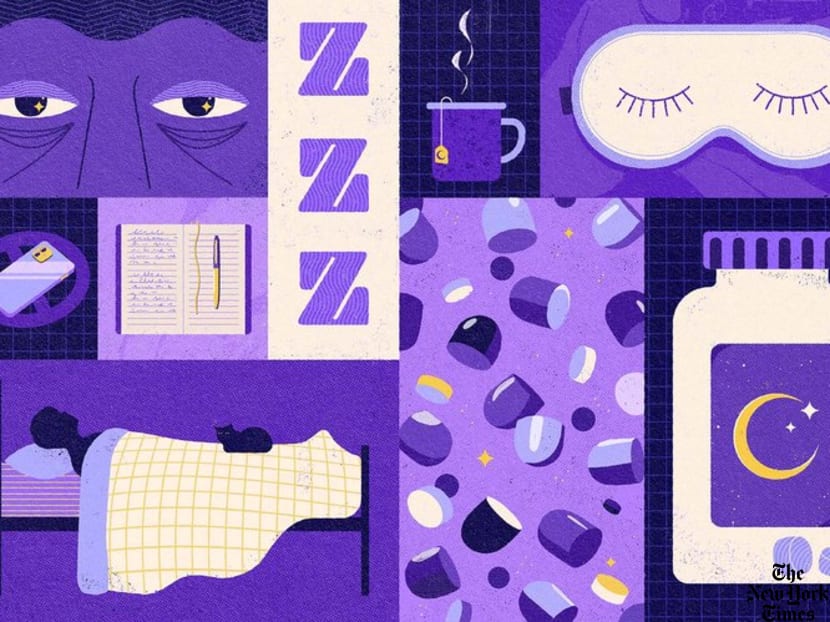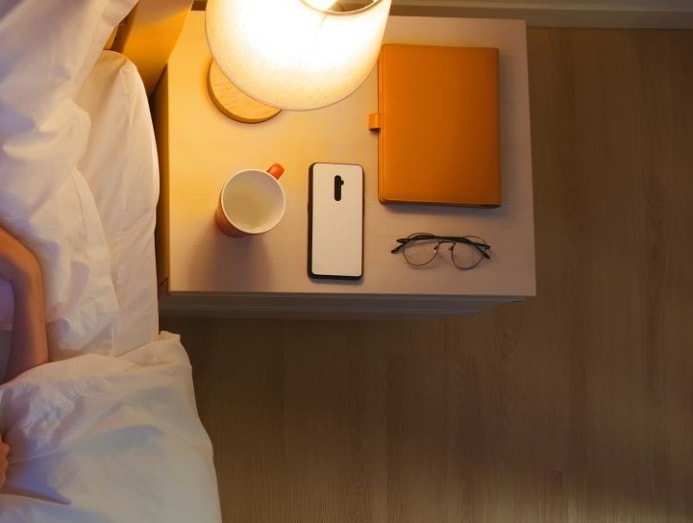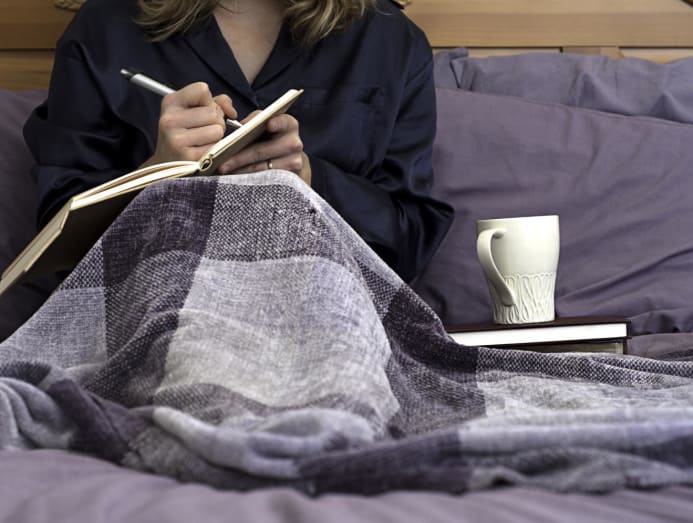How insomnia sufferers can start sleeping well at night without taking melatonin
Having trouble sleeping without taking a sleeping pill? Sleep experts say that melatonin is not addictive – there is no evidence that you can become physically dependent on the supplement, and you typically won’t develop withdrawal symptoms if you stop taking it.

As increasing numbers of people turn to melatonin, and more report taking high doses of the supplement, those who try to give up the supplement might find the process harder than they anticipated. (Photo: Mike Ellis/The New York Times)
Whether you reached for melatonin to ward off the “coronasomnia” that set in during the pandemic or have turned to the supplement for years, taking it can become a comforting nightly ritual – almost like an insurance policy for uneasy sleepers.
For some, though, that ritual has become an annoyance. As increasing numbers of people turn to melatonin, and more report taking high doses of the supplement, those who try to give up the supplement might find the process harder than they anticipated.
On TikTok, the hashtag #melatoninaddict has racked up more than a million views, with people swapping stories about craving the supplement, or being unable to sleep without it. People on Reddit forums fret over how to stop taking melatonin after years of nightly use.
Eric Brost, 33, started taking melatonin when he was in graduate school and was struggling to fall asleep. Over the five years that followed, he yo-yoed between doses, trying to taper to half a pill at a time before going back to one each night, or on some nights, more than one. Each time he tried to wean off melatonin, he found himself returning to it.
“I’d go back to taking it just out of anxiety,” he said. He eventually went to a sleep therapist, who encouraged him to stop taking the supplement entirely. He started cognitive behavioural therapy for sleep, which helped him get through the night. “I just cut cold turkey,” he said.

Melatonin is not addictive, according to sleep experts and psychologists. There is no evidence that you can become physically dependent on the supplement, and you typically won’t develop withdrawal symptoms if you stop taking it. But if you’ve become convinced that taking melatonin is crucial for sleep, experts say, you still may struggle to kick the habit.
“You can become psychologically dependent on Tic Tacs if you believe you have to have them,” said Philip Gehrman, a clinical psychologist with the Penn Sleep Center at the University of Pennsylvania.
Someone who relies on melatonin might worry that they can’t sleep without it – an anxiety that, in itself, makes falling asleep more difficult, said Jennifer Martin, president of the American Academy of Sleep Medicine board of directors and a professor of medicine at the David Geffen School of Medicine at UCLA. She’s seen that pattern in a number of patients.
“People say, ‘I try and try and try, and then I give up and take something,’” she said. “But it’s the giving up that helps them fall asleep, not the taking something.”
So what should you do if you want to wean yourself off melatonin? Sleep specialists and doctors outlined what you should know about the supplement, and offered a few tips to keep in mind.
HOW MELATONIN WORKS
Melatonin is a hormone produced primarily in a structure in the brain, called the pineal gland, that regulates the sleep-wake cycle. During the day, the gland does not create melatonin. After the sun sets, darkness triggers it to secrete the hormone, causing drowsiness and other signals that it’s time to sleep.
When you take a melatonin pill, liquid or gummy, “You’re just supplementing what your body is naturally doing anyway,” said Dr Marri Horvat, a sleep disorder specialist at the Cleveland Clinic.

Some studies have shown that melatonin can help people fall asleep faster and stay asleep longer. But in several clinical trials, supplements were about as effective as a placebo, Dr Martin said, suggesting that the sleep aid’s power might be partly psychological.
IS LONG-TERM MELATONIN USE SAFE?
Like most supplements sold in the United States, melatonin isn’t regulated by the US Food and Drug Administration as strictly as prescription or over-the-counter medication – and the amount of melatonin in a pill or gummy can vary drastically, said Dr Charles A Czeisler, chief of a division of the Brigham and Women’s Hospital that treats sleep and circadian rhythm disorders.
In general, experts consider melatonin to be safe for short-term use, say, a few nights per week for one to four weeks, Dr Horvat said. Most people will not experience side effects, she said, although some may feel groggy or lightly “hung over” when they wake up. She typically tells patients to first try taking it once or twice a week to see if it helps.
Doctors know far less about the long-term effects of melatonin. “For almost any medication, whether it’s prescription or over-the-counter, rarely are long-term studies done,” Dr Gehrman explained. Several reviews have attempted to quantify long-term side effects of melatonin but have found precious little data from rigorous studies.
Taking the supplement for years likely poses minimal risk for the average person, experts said, but there isn’t enough evidence to say for sure.
HOW TO START SLEEPING AT NIGHT WITHOUT USING MELATONIN
Trying to fall asleep without melatonin can feel overwhelming, especially if you’ve taken it for years, Dr Horvat said. Experts offered tips to make the process a little easier:
MAKE A GAME PLAN BEFORE BED
Rather than waiting until bedtime to decide whether or not you’ll take the supplement, make a plan ahead of time. Otherwise, you may agonise over the decision, effectively winding yourself up when you’re supposed to be relaxing, Dr Gehrman said. “There should be no guesswork involved,” he added.

He suggested that people forgoing their nightly melatonin make a backup plan. You can tell yourself that if you still can’t sleep by 11 pm, for example, you’ll take it.
“Sometimes even knowing that it’s there will help,” said Dr Margarita Rohr, a clinical assistant professor of medicine at NYU Langone Health.
OPT FOR THE PILLARS OF GOOD SLEEP HYGIENE
If you’re trying to sleep without melatonin for the first time in a while, healthy sleep habits are particularly important. Aim to wake up and go to bed around the same time each day, including on the weekends. Make sure your room is quiet and dark enough (a sleep mask can help block external light) and avoid rigorous exercise for at least an hour and a half before bed, Dr Rohr said. (Working out earlier in the day, however, can help you sleep.)
You should also limit your caffeine consumption throughout the day and avoid alcohol in the hours right before you go to sleep.
Since blue light suppresses your natural melatonin production, you should try to avoid screens for one to two hours before bedtime, Dr Horvat said. “Your phone should not be in your bedroom,” she added.

Instead, try journaling before bed, particularly if you are anxious about falling asleep. You can make a list of your worries, getting them down on paper instead of brooding over them.
And if you wake up during the night and can’t fall back asleep, don’t just lie there. Get out of bed and try doing an activity that relaxes you, like reading a physical book or listening to a podcast.
“Tossing and turning just makes you more frustrated,” Dr Gerhman said. “It doesn’t make you more sleepy.”
SWAP THE SUPPLEMENT FOR A DIFFERENT RITUAL
People might find melatonin effective because taking it provides a routine, signalling to your brain that you’re ready to sleep and functioning as a comforting ritual, Dr Rohr said.
You can swap melatonin for something else – a nightly cup of chamomile tea, for instance, or a warm bath before bed. Try something you can repeat night after night, making it part of your sleep hygiene practice.
SEEK OUT ADDITIONAL HELP IF YOU NEED IT
People sometimes use melatonin as a Band-Aid, rather than addressing underlying issues that prevent them from sleeping through the night. Anxiety and depression can contribute to insomnia, and conditions like sleep apnea can also cause poor sleep.
If you’re concerned about your sleep patterns, or find yourself unable to fall asleep each night for a prolonged period, reach out to a primary care physician or sleep disorder specialist. They can screen for any underlying issues and offer strategies for dealing with insomnia, including cognitive behavioural therapy.
By Dani Blum © 2022 The New York Times
This article originally appeared in The New York Times.





